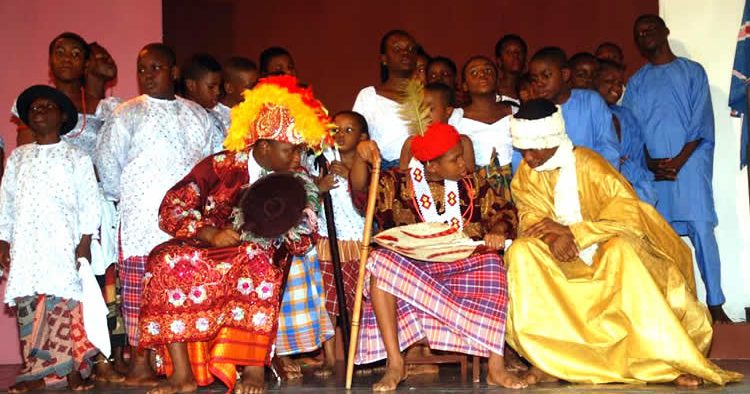‘Eriri’: Celebrating Nigeria’s Diversity
Share

 IFEOMA OKEKE
IFEOMA OKEKEIt was an evening of explicit exposure to diverse cultures of Nigeria by children through drama, music and dance, as the National Theatre, Cinema Hall II, blazed in colourful attires of diverse tribes.
The joy of parents knew no bound as they watched their children on stage being the centre of attraction as they displayed creativity through poem recitation, exceptional dance styles, songs with messages of unity, and displaying exceptional acting skills.
Everyone could tell that a lot of preparations had gone into this year’s 5th Children Creative Station organized by the National Troupe of Nigeria which took place a the National Arts Theatre, Iganmu on Sunday. It was an avenue to encourage and nurture talents in young children and youths, who otherwise may not have an avenue to develop their talent outside the walls of a formal school.
The National Troupe has since its formal establishment exhibited competence in packaging high artistic productions especially designed for national and international consumption and ‘The Children Creative Station’ happens to be one of them.
This year’s event had the theme unity in diversity running through the play ‘Eriri’ staged by the children. The play highlights the need for unity in Nigeria and the consequence it could have on the development of the country. ‘Eriri’ is a historical-socio folk-drama. It is the meta-aesthetics of the Nigerian socio-political and cultural narrative through 1914, the year of amalgamation to present day.
The play tells the story of Eriri, a symbolic and abandoned black baby who ends up in the home of Frederick and Flora Lugard as a foster child in 1914. The naming of the child, which coincides with amalgamation of different clans into one central leadership under the colonial administration of the Lord Frederick Lugard, creates the rising conflict of the play as the paternity of the baby is contentious.
The plot and complications of the play are explored through a widening chain of interplays of rejection, suspicion, power struggle, mutual distrust and disharmony amongst the different clan heads, the contentious paternity of the baby and the unpredictability of Lugard’s motives and actions as the first Governor-General of Nigeria.
The collective resolution of the clan leads to reclaiming the baby from the Lugards’. This fails due to their inability to produce the biological parents.
Eriri spends most of her childhood and education with the foster parents in England. She eventually returns to Nigeria and helps to fan the embers of nationalism and political independence. Her story travails through the trying pre and post-independent years of Nigeria’s political odyssey till the year 2014.
The play deals with the fragile and sensitive links of individualism to our collective and shared humanism. The intention is to provide a histrionic interface between history and theatrical experience for young people.
The children put up a good performance in their acting, choice of words and ability to convey the intended messages. It was clear they understood the theme and motive behind the play and where able to communicate it effectively.
The choice of costume is also commendable. They depict vividly all areas of the Northern and Southern protectorate, thereby giving people the reason to appreciate the cultures of others.
Martin Adaji, artistic creator and chief executive officer of National Troupe of Nigeria said it is their hope that the dialogue engendered  through this one month creative experience will continue to regenerate in the fertile and imaginative minds of all the children that participated in this year’s Children Creative Station.
through this one month creative experience will continue to regenerate in the fertile and imaginative minds of all the children that participated in this year’s Children Creative Station.
 through this one month creative experience will continue to regenerate in the fertile and imaginative minds of all the children that participated in this year’s Children Creative Station.
through this one month creative experience will continue to regenerate in the fertile and imaginative minds of all the children that participated in this year’s Children Creative Station.He noted that the dream envisaged by the troupe is that children who are talented will be able to explore their dreams to the limit of their abilities, adding that the station is a collection of children from diverse background and hopes that the bond of friendship and teamwork will be lasting and have positive impact on each child.
According to Josephine Igberaese, project co-ordinator: “The play gives me hope that our children and youths understand the complexities and difficulties that the country is facing. We are indeed very happy to have a generation that will be detribalized, who do not carry on their shoulders the burden of cultural differences, religion and social class.”
She said that the programme is to help the children to cross the borders of their cultural luggage with dignity, knowing who they are and where they come from, first and foremost.





